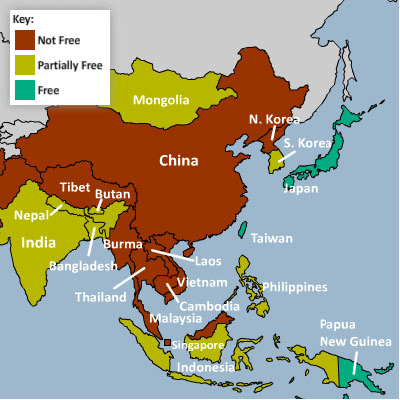




The level of press freedom in the Asia-Pacific region has fallen, with conditions in China "highly repressive" and with extensive state and Communist party controls also evident in Laos and Vietnam, U.S. human rights group Freedom House said in an annual survey Monday.
The region is also home to two of the survey’s poorest performers, Burma and North Korea, it said, citing a modest decline in the average score for the Asia-Pacific in the group's latest annual media freedom index assessing the degree of print, broadcast, and Internet freedom.
Only five percent of the region’s population had access to free media, while 46 percent live in "partly free" and 49 percent in "not free" media environments.
"Conditions in the world’s largest poor performer, China, remained highly repressive in 2010," Freedom House said in its report, Freedom in the World 2011, released in conjunction with UNESCO’s World Press Freedom Day.
Chinese authorities increased censorship and Communist Party propaganda in both traditional and online media, with a focus on politically sensitive issues like the awarding of the Nobel Peace Prize to jailed democracy advocate Liu Xiaobo in October, it said.
"Detailed party directives—which can arrive daily at editors’ desks—also curbed coverage related to public health, environmental accidents, deaths in police custody, and foreign policy," the report said.
Dozens of activists, dissidents, and journalists remained in jail for their writing at year’s end, with minority language journalists facing "special persecution."
Test limits
Nevertheless, Freedom House said, journalists and bloggers continued to test Beijing's limits of permissible expression by exposing official corruption, circulating underground political publications, and engaging in imaginative efforts to circumvent China’s comprehensive Internet filtering system, the so-called Great Firewall.
In the region, the social-networking website Facebook remains unavailable in China and Vietnam.
“What we see in both countries, I believe, is a sort of cat-and-mouse game where there is obviously severe control over news media and the media content, but where people are trying to push back against these very repressive boundaries," said Freedom House senior researcher Karin Karleka.
"So there are definitely controls in place by both governments to hold onto the news agenda. But I would say that activists in both countries are pushing back."
The two countries were among the worst performers worldwide.
Cambodia’s score also deteriorated due to an "aggressive use of disinformation and defamation legislation against journalists, as well as a reduction in media diversity following the closure of an opposition newspaper," Freedom House said.
In Burma, Freedom House saw "marginal improvements" after a new civilian government took over from the military junta after elections in November 2010.
The "improvements" stemmed from "somewhat more open media access" to opposition leader Aung San Suu Kyi following her release from house arrest last year.
Status changes
